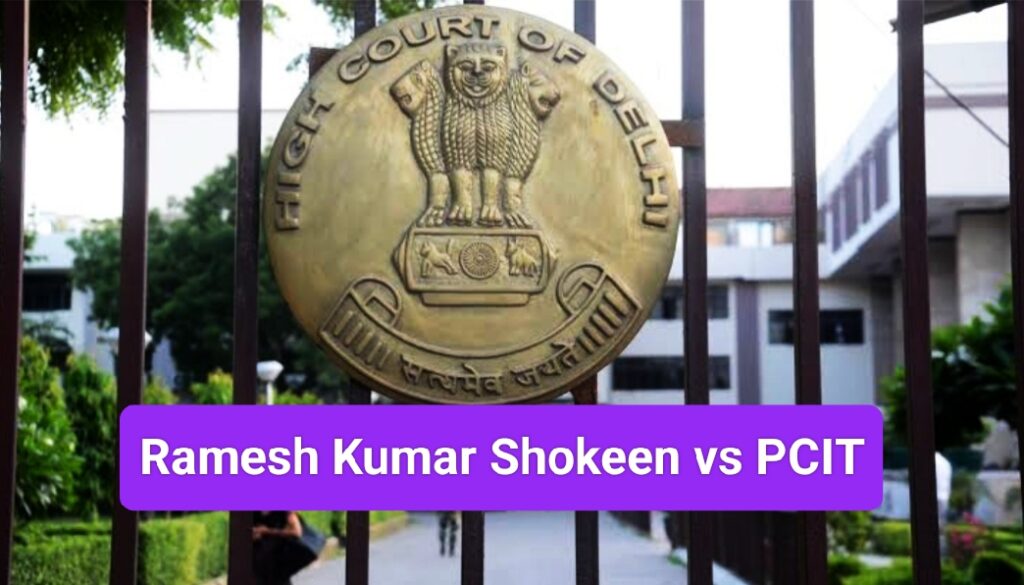The court emphasized that Section 119(2)(b) is a beneficial provision, intended to allow for exceptions and refunds in cases of genuine hardship. Decisions made under this provision must include proper justification, aligning with both procedural fairness and the legislative intent behind the provision.
The Delhi High Court, in Ramesh Kumar Shokeen vs. PCIT [WP(C) 13112/208], highlighted the necessity of reasoned orders and adherence to legislative intent in cases of delay condonation under Section 119(2)(b) of the Income Tax Act, 1961. This judgment underscores that rejection of applications for delay condonation must include clear reasoning and should not only rely on supplementary affidavits from the Revenue.
Case Background
Mr. Ramesh Kumar Shokeen, a retired Indian Air Force officer and practicing advocate, faced a rejection of his delay condonation application filed under Section 119(2)(b). Mr. Shokeen had submitted his income tax return (ITR) for Assessment Year (AY) 2013-14 on July 21, 2016, declaring an income of INR 3,24,600/- with a TDS of INR 59,170/-. However, as the return was filed beyond the deadline, the Revenue informed him that his ITR could not be processed, advising him to seek a delay condonation from the Principal Commissioner of Income Tax (PCIT).
Citing a lack of TDS information and non-receipt of TDS certificates as reasons for the delay, Mr. Shokeen filed a condonation application with the PCIT. However, on March 28, 2018, the PCIT rejected his application, stating that Mr. Shokeen’s case did not meet the “genuine hardship” criteria as outlined by a Central Board of Direct Taxes (CBDT) Circular. This decision prompted Mr. Shokeen to file a writ petition challenging the rejection.
Arguments and Court’s Findings
During the hearing, Mr. Shokeen’s counsel argued that the PCIT’s order was unreasoned, thus violating Section 119(2)(b) requirements. In response, the Revenue’s counsel maintained that the rejection was justified, asserting that Mr. Shokeen’s situation did not qualify as genuine hardship.
The court emphasized that Section 119(2)(b) is a beneficial provision, intended to allow for exceptions and refunds in cases of genuine hardship. Decisions made under this provision must include proper justification, aligning with both procedural fairness and the legislative intent behind the provision.
Referencing a Supreme Court precedent, the court stressed that any reasons for rejection must be present in the initial order and cannot be supplemented later through counter-affidavits. Noting the lack of justification in the PCIT’s decision, the court dismissed the Revenue’s arguments and ordered a fresh consideration of Mr. Shokeen’s application.
Judgment Highlights
The Delhi High Court’s judgment reinforces the principles of procedural fairness and the importance of transparency in tax administration. The court mandated that all administrative decisions, especially those affecting taxpayer relief under beneficial provisions like Section 119(2)(b), should be supported by clear reasoning. This ruling underscores the commitment to proper administration of tax laws and highlights the necessity for authorities to align decisions with both legislative intent and procedural integrity.
In conclusion, this judgment serves as a reminder for tax authorities to follow procedural mandates, ensuring taxpayer rights are upheld in line with statutory provisions aimed at genuine hardship relief.
Provisions u/s.119(2)b of Income Tax Act 1961
The Board may, if it considers it desirable or expedient so to do for avoiding genuine hardship in any case or class of cases, by general or special order, authorise any income-tax authority, not being [a Joint Commissioner (Appeals) or] a Commissioner (Appeals) to admit an application or claim for any exemption, deduction, refund or any other relief under this Act after the expiry of the period specified by or under this Act for making such application or claim and deal with the same on merits in accordance with law.
Also Read: Home Loan Interest Benefit Under New Tax Regime (Section 115 BAC): A Complete Guide
READ MORE
Notification 116/2024: Redefining Arm’s Length Price Under Section 92C of Income Tax Act
GST Panel Proposes Increase in Affordable Housing Price Limit to ₹56 Lakh Nationwide

